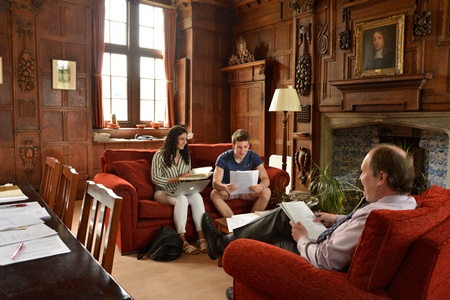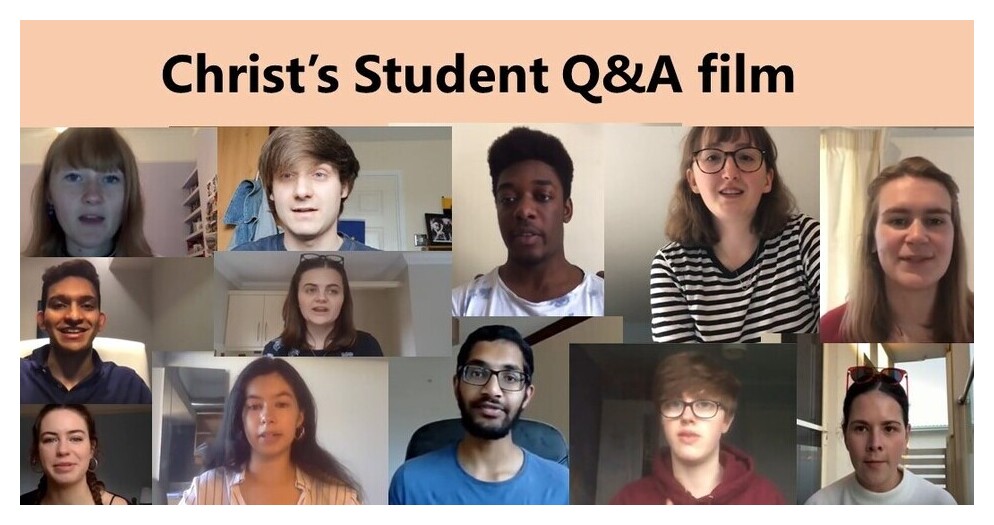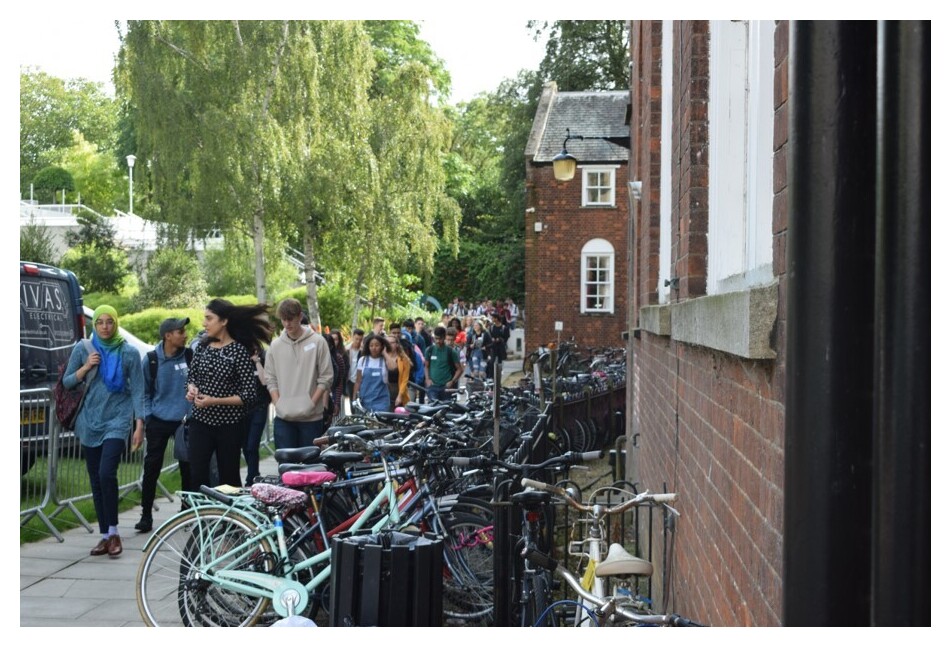
- Why study Mathematics at Christ's College?
- Course content and structure
- Teaching
- What do our students think?
- How to apply
- Helpful Resources
- Open Days and Online Events
- Need more information?
Why study Mathematics at Christ's College?
For many years Christ’s has been particularly strong in Mathematics, with our undergraduates achieving excellent results. Since the College was founded in the 16th century, people of all backgrounds have come here to sample a broad mathematical education.
Famous alumni include Nicholas Saunderson, who became Lucasian Professor at Cambridge – the same position held by Isaac Newton, Charles Babbage and Stephen Hawking – working on statistics and calculus. Blind from childhood, he developed special techniques for handling mathematical calculations and became known as an outstanding teacher. Another Christ’s mathematician was Sir Christopher Zeeman, renowned for his work in topology and catastrophe theory.
Our current Fellows continue that great tradition, combining world-class research with outstanding teaching. Our Senior Tutor (and Mathematics Director of Studies) Dr Robert Hunt was Deputy Director of the renowned Isaac Newton Institute for Mathematical Sciences and is a winner of the Pilkington Prize for excellence in teaching at the University of Cambridge.
Many of our graduates choose further study or research, while others go into areas including investment management, banking, management training, the civil service, GCHQ, teaching, computing, statistics, sales forecasting, logistics, energy and mathematical modelling in industry.
Course content and structure
The Mathematics course (or ‘tripos’) is a three- or four-year degree. After three years you gain a BA Honours degree. You can then choose to study for a fourth year to complete a Master of Mathematics (MMath) degree.
Please visit the University website for full details of the undergraduate Mathematics course content and structure.
Teaching
As well as lectures at the University (just five minutes’ walk from Christ’s in first and second year) you have weekly ‘supervisions’ here at the College. These small-group tutorial sessions give you the advantage of personally-tailored guidance and tuition – one of the advantages of a Cambridge education.
At Christ’s we particularly encourage you to discuss points of interest or concerns you come across in lectures or your own studies. First-years attend weekly seminars where Fellows elaborate on lecture material, answer general questions and explore the syllabus in greater depth. And the library holds a valuable mix of both modern and ancient maths books, including originals of Newton's Principia.
Currently Christ's College has seven Fellows in Mathematics whose teaching and research interests span a broad range including Pure and Applied Mathematics, Abstract Algebra, Statistics and Theoretical Physics.
- Dr Henry Bradford Group theory
- Dr Robert Hunt (Director of Studies) Causality in differential equations, theoretical fluid dynamics
- Professor Frank Kelly CBE FRS Random processes, networks and optimisation
- Professor Peter Landshoff Mathematical physics
- Professor Simon Tavaré Statistics and computational biology
- Dr Christopher Thomas Theoretical high energy physics
- Professor John Wilson Group theory
Christ’s Director of Studies in Mathematics, Dr Robert Hunt, has particular expertise in the CATAM option (available in 2nd and 3rd year) which shows students how to use computers to solve mathematical problems and develop programming, investigative and presentational skills.
Our Mathematician community here at Christ’s is a close-knit one which gets together regularly to discuss mathematical problems and enjoys an annual dinner.

What do our students think?
Read about the experiences of Maria, James and Xinhua studying Mathematics at Christ’s.
If you’d like to hear from other Christ's students, please watch the Christ's student Q&A film, and visit our Student Profiles page.
How to Apply
Details of the application process including the dates and deadlines are given on our how to apply page. We welcome applicants from all backgrounds and school types. If you will be applying from outside the UK, we recommend that you also read our dedicated section for international students.
Subject requirements
We admit students taking three A-levels, the International Baccalaureate and a range of equivalent qualifications. To apply for Mathematics:
- You should study Mathematics at the most advanced level available in your curriculum. For students taking UK-designed A-levels*, you are required to take both Mathematics and Further Mathematics as two of your subjects.
- Physics is also a useful subject.
- Applicants for Mathematics must also take STEP examinations, and we are happy to consider applications from students who have already taken STEP (Papers II and III). There is further information about STEP, how we use it and how to prepare for it.
- If you are studying in the Scottish education system, please also read the notes for Scottish applicants.
*UK-designed A-levels include CIE A levels but do not include Singapore A levels.
Maths or Maths with Physics?
All Maths applicants apply for Mathematics in their UCAS application. On the additional questionnaire(s) you will then be asked to choose between the two first year options in the Maths course:
Information about these options is in the Part 1A course outline and in the Mathematics with Physics leaflet. Please bear in mind that applicants for Mathematics with Physics must be taking Physics at A level, IB Higher Level or equivalent.
Interviews
If we invite you for interviews, these usually take place in early December. Those invited for Cambridge interviews are normally interviewed for 35-50 minutes in total. At Christ’s, we usually split the time into two interviews with academics in Mathematics. Typically one will lead on Pure Mathematics, the other on Applied Mathematics. All applicants will also be given some questions to look at before one of the interviews starts, and a discussion of your solutions to these questions will form part of the interview. During these subject interviews, we may ask questions on topics with which you are not already familiar: the aim here is to assess your innate mathematical ability when working through unprepared questions and your ability to absorb quickly new ideas. This approach minimizes the effects of a candidate’s background and teaching and creates a more level playing field. We will not try to catch you out but rather will help you work through unseen problems. We sometimes ask candidates to think out loud as they tackle interview problems as a means of helping us to understand their individual approach to Mathematics. We are not simply trying to test knowledge or memory of theorems, etc., as these will be tested in due course by A-level, IB Higher or other examinations.
Further information about interviews (including two useful films) is available in the Cambridge interviews section. We also hold interviews in a number of locations overseas. If this may be relevant for you, please see the international students section .
Offers
Christ's College does not have fixed quotas of places for different subjects and the exact numbers admitted in any one year will depend upon the strengths of the fields of applicants in various subjects. However, our aim is to admit around ten students each year in Mathematics.
Our typical offer is A*A*A at A-level including Mathematics and Further Mathematics (or comparable grades in other qualifications) plus grades 1 or higher in each of STEP papers II and III; and we are happy to receive applications from students who have already completed STEP. Note that Christ's offer holders who go on to achieve the relevant A-level (or equivalent) conditions and secure a grade 1 or higher in either STEP II or III will automatically be placed in the Summer Pool for consideration by other Colleges (regardless of the grade they secure in their second STEP paper), if we cannot accept them at Christ's.
The international students section has further information about typical offers for other qualifications. If you will have already finished school when you apply, please see the page for post-qualification applications.
STEP
STEP (Sixth Term Examination Paper) Mathematics is designed to test candidates on questions that are similar in style to undergraduate mathematics. Your preparation for STEP will be an important part of your preparation for Mathematics at Cambridge, and we recommend that all applicants and offer holders make use of the free online STEP Support Programme, which includes weekly online modules and a discussion forum. If you are planning to take STEP 2 and 3 at the end of Year 13, we recommend you start studying the Step Support Programme Foundation modules in Year 12.
Everyone can have a bad day, a bad interview, or a bad examination so we try to avoid allowing the prospect of a place at Cambridge to rest on a single observation; therefore A level, IB or equivalent grades, STEP grades and interview performance all feed into the final decision. One advantage of STEP is that we can see the exact marks achieved by a candidate, and can also look at candidates’ scripts where appropriate in order to judge the quality of the answers. However, a flexible attitude is taken to our requirements, and we are always ready to review them on a personal basis in the light of special circumstances.
We are sympathetic to the problems that some schools have in providing special teaching for STEP, and we always pay particular attention to the assessment of candidates by their own teachers. Some offer-holders whose schools have difficulty in providing specialized teaching are invited to participate in University-run STEP preparation days.
Most students (including international students if you make the arrangements) can take STEP exams at school. The Cambridge Admissions Testing website has the practical information you'll need, including how to register, what to do if you can't sit STEP at a school, and the dates and costs. You can wait until you've got an offer to register for STEP: the registration deadline is normally in April and the exams are taken in June (normally just after A levels). If you have practical questions about taking STEP that you can't find the answer to on the website, we recommend that you contact the Cambridge Admissions Testing Support Team.
Taking a gap year
We are always willing to consider Mathematics candidates who wish to take a gap year. Because of the danger particular to Mathematics of going "off the boil" and losing the knack of algebraic manipulation, we would encourage you to ensure that your mathematical skills are kept honed.
Helpful Resources
| Maths Open Day recordings | |
| Additional in Coronavirus times | MEI (Maths Education) resources for students studying at home |
| Additional in Coronavirus times | NRICH Maths at home |
| Advanced Mathematics Support Programme | Advanced Mathematics Support Programme See in particular A level Mathematics resources and A level Further Mathematics resources. If you are studying independently, Integral offers an online Further Mathematics course. |
| STEP Support Programme | Free online resources developed by Cambridge University Mathematics Department and NRICH to support Year 12 and Year 13 students preparing for STEP examinations. If you are planning to take STEP 2 and 3 at the end of Year 13, we recommend you start studying the Foundation modules in Year 12. |
| STEP questions with solutions | The Underground Mathematics website, previously funded by the DfE and based at the University of Cambridge, offers free resources to support the teaching of A level mathematics, as well as selected past STEP questions with fully worked solutions and explanations. |
| All STEP past papers from 1998 | Past papers available to download from Cambridge Assessment, including answers to all questions from 2004, and solutions with explanation and mark scheme for the 2011 STEP I paper. |
| A-level notes | Notes for various parts of the A-level Mathematics and Further Mathematics specifications |
| Meikleriggs Mathematics | Dr Peter Mitchell's website contains lots of useful mathematics including complete solutions to STEP papers from past years. |
| NRICH Mathematics | Free online resources to help you to develop mathematical reasoning and problem-solving skills. See in particular curriculum content, advanced problem-solving materials, prepare for university, and live problems |
| NRICH Collection | Adventures with Complex Numbers |
| Mathematical reading list | Reading suggestions from Cambridge University Maths department |
| Plus Magazine | Maths magazine that aims to introduce readers to the beauty and the practical applications of mathematics. |
| Maths Lecture Films | Lectures with mathematicians at Oxford and Cambridge |
| The secrets of Mathematics | Talks and lectures from Oxford Mathematicians |
| Gresham College Maths lectures | Free lectures online including Maths vs. Covid-19 and other London Mathematical Society lectures. |
| A brief History of Mathematics | BBC podcasts |
| HE+ Mathematics | Website for secondary school students who would like to explore university maths |
| CamGuides | Introducing the academic and information skills that you will need during your studies, as well as how and where you would be working |
Come to an Open Day or Online Event
 Online events:
Online events:
There are recordings from the 2021 and 2020 Cambridge Maths Virtual Open Days, which you can watch at your convenience. For Christ's events, our open days and events page advertises online opportunities as well as events you can attend in Cambridge.
If you’d like to find out more about the course in person, come along to a College Open Day (these include a maths meeting), the Maths Open Day (April/May) or, if you are eligible, you can apply for a place on our Women in Maths residential (March/April),
Further subject-specific opportunities you might wish to consider include Subject Masterclasses organised by Cambridge Admissions Office, Cambridge Physics Lectures and Maths-specific talks in the July Cambridge Open Days. Do also look out for the Cambridge Festival in March which normally has lots of relevant talks. If you are a UK student from a background where there is little tradition of entry to Higher Education, you can apply to attend a Sutton Trust Summer School in Maths or to shadow a current maths undergraduate via the Cambridge SU Shadowing Scheme (do be aware that there's a high proportion of applicants to places for both of these last two opportunities so please don't be discouraged if you don't get a place).
Need more information?
For more detail of what the course involves, please take a look at Undergraduate Mathematics Admissions on the University website, and read the Faculty of Mathematics information for prospective students too.
And if you have any other questions, send them to us at admissions@christs.cam.ac.uk. We look forward to hearing from you.
Undergraduate Admissions main page / Back to the subject list / How to apply / Why choose Christ's? / Women in Maths residential
- Anglo-Saxon, Norse & Celtic
- Archaeology
- Architecture
- Asian & Middle Eastern Studies
- Chemical Engineering and Biotechnology
- Classics
- Computer Science
- Economics
- Education
- Engineering
- English
- Geography
- History
- History and Modern Languages
- History and Politics
- History of Art
- Human, Social and Political Sciences
- Land Economy
- Law
- Linguistics
- Management Studies
- Medicine
- Modern and Medieval Languages
- Music
- Natural Sciences
- Philosophy
- Psychological and Behavioural Sciences
- Theology, Religion, and Philosophy of Religion